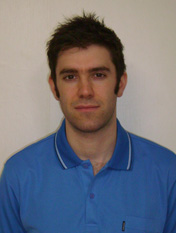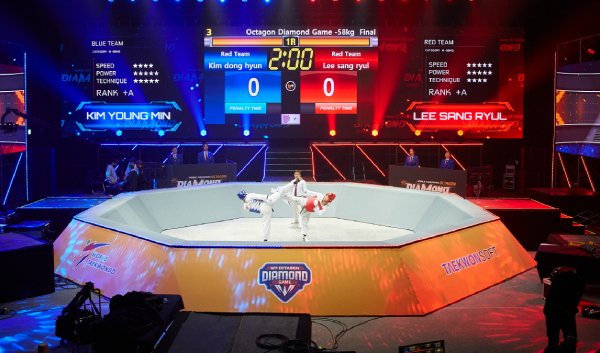태권도는 이미 전 세계 6천만 명 이상이 수련하는 세계적 무도요 글로벌 스포츠다. 그러나 한국에서 하는 태권도와 다른 나라에서 하는 태권도가 모두 똑 같은 모습은 아니다. 전주에서 태권도를 배우고 있는 벽안의 수련생 롭 맥거번 씨(28)에게 비친 태권도의 모습은 어떤 것일까. 영국 출생의 영어강사로 2년째 전주 상무체육관에서 태권도를 수련하고 있는 맥거번 씨는 최근 ‘같은 이름, 다른 룰- 한국과 영국의 태권도’라는 장문의 글을 본사에 기고해 왔다. 맥거번 씨의 기고문을 요약해서 소개한다.
 |
| 롭 맥거번 씨. |
1988년 서울올림픽을 통해 태권도는 전 세계에 그 이미지를 홍보하는 기회를 가졌다. 올림픽 스포츠가 되면서 태권도만큼 확고한 지위를 차지한 무도는 없다. 그러나 한국의 태권도와 다른 나라의 태권도에는 많은 차이가 있다.
영국에 처음 와본 한국의 사범은 영국 수련생들의 경기력에 놀랐다고 말한다. 다른 많은 나라에서도 수련생들은 경기에 훨씬 더 치중한다. 그럼에도 불구하고 올림픽에서 한국이 더 많은 메달을 휩쓸어가는 이유가 무엇일까. 영국에서 생활하고 있는 한국인 사범은 영국 수련생들에게서 적지 않은 허점을 발견했다고 한다. 기본기에 충실하지 않다는 것이다.
한국에선 골목마다 태권도 도장이 있고 아침부터 저녁까지 수련생들의 기합소리가 끊이지 않는다. 영국에선 아직까지도 태권도만을 가르치는 도장을 찾아보기 쉽지 않다. 한국에서는 태권도가 ‘국기’로 받아들여지고 있지만 다른 나라에서는 그저 많은 무예나 스포츠 가운데 하나일 뿐이다. 한국에서의 태권도는 평생을 정진해야할 예술(무도)이다. 그러나 다른 나라 사람들은 그저 손과 발을 쓰는 기술(스포츠)로 받아들일 뿐이다.
현실적으로 드러나 보이는 차이점도 하나둘이 아니다. 영국에서는 1단을 따는 데 4~5년이나 걸린다. 한국에서는 불과 1년 만에 1단이 된다. 한국에서는 한 달에도 한두 번씩 승단심사를 받을 수 있지만 영국이나 다른 유럽국가에서는 한해 한 번밖에 기회가 없다. 반면 한국에서는 한 주일에도 4~5회 수련을 하고 영국에서는 겨우 1~2회 수련한다는 사실도 잊어서는 안 된다.
한국에서는 일단 단을 따면 더욱 열심히 태권도를 수련한다. 영국에서는 단을 따면 바로 다른 사람들을 가르치려 든다.
영국에서의 1단은 한국에서보다 훨씬 더 큰 성취로 보인다. 영국인들은 1단으로 태권도의 모든 것을 다 이룬 것으로 받아들이지만 한국인들은 1단을 겨우 정상에 오르기 위한 베이스캠프에 이른 것으로 받아들인다.
2012년에는 올림픽이 영국에서 열린다. 영국인들에겐 더 없이 유리한 기회다. 그러나 영국 수련생들을 지도해온 한국인 사범은 “유럽 여러 나라들에게 좋은 기회인만큼 한국에게도 좋은 기회가 될 것임을 잊지 말라”고 충고한다.
------------------------------------------------------------------------------
Same Name, Different Rules: Taekwondo in Korea and the UK
- Rob McGovern
Martial arts competitions have been ritual on the Korean peninsula long before the peninsula actually had a name. Techniques were learned and developed from observing both the offensive and defensive techniques of the beasts that dwelled there. These forms evolved over time and can be traced back to murals on the tombs of warriors. The name may have changed but whether it is called subak, taekkyon, takyyon or taekwondo one thing is true of all, followers of these forms devoted themselves to the art and to preserving their country, through altruistic means, and their way of life.
Being British and living in Korea I am often left wondering how Korea is perceived at home and as all of my taekwondo training has been undertaken in Korea I am left wondering how taekwondo, as practised in Korea differs, if at all, from taekwondo in the UK? How does the Korean terminology sound with a Scotch accent or a Welsh one? How is the philosophy interpreted in a country that has escalating rates of violent crime?
Taekwondo is undoubtedly and wholeheartedly Korean but it also a global sport and The global martial art. Practitioners respect these origins every time the step into the dojang, greeting their master as ‘Kwan Jang Nim’ and observing codes of behaviour and etiquette that may well not exist in the world outside the gym window.
Modern taekwondo has become the single most popular martial art in the world, afforded the prestigious status of Olympic event. It is however constantly changing and will continue to do so. Forms, or poomse, change from one year to the next, with subtle changes being continually introduced. There are, however more drastic changes happening everyday, in all the hundreds of countries that taekwondo is practised in. Like a giant Chinese whisper, taekwondo is interpreted and reorganized to fit in with the user’s needs and desires. Some prefer poomse, some prefer sparring and yet others crave the self defence aspects that are sometimes under utilized but there none the less.
Master Peter Hankin has been studying taekwondo for 23 years and runs a WTF club in Liverpool. He started by wandering into a community centre after hearing screams coming from inside. The instructor that day told him that observing the class wasn’t an option. 23 years later and with the support of a sympathetic bank manager he runs his club in Tuebrook, Liverpool and takes his students to competitions all over world.
The sounds that drew Master Hankin to his first class can be heard all over Korea, on almost every street, on almost everyday. The situation in the UK was, and still is, very different and this is why Master Hankin opened his own school. "I’d been teaching taekwondo in and around Liverpool for a number of years but I thought that we needed somewhere where people could come regularly, a fixed venue. So about 10 years ago I took a loan and rented this gym for the soul use of taekwondo." In many towns in the UK there are no taekwondo dojangs at all, but in Korea they are as prevalent as banks and post offices, maybe more so. Master Hankin adds "Taekwondo is their[Koreans] national sport and so a lot of people do it" and maybe these opportunities are crucial to understanding the differences between Korea and the UK.
The Olympics of 1988 in Seoul provided a showcase opportunity for taekwondo to promote itself and the huge, synchronized performance that graced the opening ceremony seems to have injected the sport with a new generation of practitioners who would take this sport all the way to becoming a medal event. The Olympics have given the sport its public image, that of kicking and kicking and more kicking. The sparring, or kyorugi, aspect of taekwondo has become the single most noticeable feature about the martial art and seems to offer another major difference between Korea and the rest of the world. Sparring provides an opportunity to become a medal winner on an international stage. The best of the best can compete for gold medals, fame and prestige at the Olympics. Master Hankin himself admits "What I find in the UK is that people are driven by gain. Basically if you can get a nice trophy or a medal then people are willing to put more effort into it."
The kicking speed, accuracy and power I saw at Master Hankin’s school were on a par with the best I have seen in Korea and I cannot commend his students highly enough. Master Lee GeunSu, a Korean who now lives and works in the UK as a Korean interpreter and also teaches taekwondo in Liverpool was surprised at what he saw when he arrived in the UK "When I first came to the UK I was very shocked by 2 things. The sparring level is very high considering most of the students are not yet 1st dan but their foot work is poor at times. This stems from a lack of basic skills."
Another major difference between Korea and the rest of the world is that in Korea taekwondo is an art, always has been and always will be, but this doesn’t seem to be the case in the rest of the world. Taekwondo literally means ‘Way of the hand and foot’ or, to put it another way ‘The art of the hand and foot’ and it is this word ‘Art’ that for me accurately describes what taekwondo is in Korea.
Why then if practitioners around the world favour sparring and are very good at it does Korea seem to dominate the Olympics? "Good basic skills" is the simple answer offered by Lee Geunsu.
What then are basic skills? Sparring practise takes centre stage and is given priority in the UK. The often overlooked self defence techniques and more importantly the poomse, the foundation of taekwondo grading, are seemingly learned out of a necessity to progress. In Korea they are revered as being the foundation on which taekwondo is built, the training ground of good basic skills.
So why are basic skills lacking and why are brown, blue and red belts in the UK so damn good at sparring? The answer may lie in the fact that the grading system is different in different countries. In the UK it can take as long as 4 or 5 years to attain a 1st Dan. In Korea this same level can be reached in just a single year. Master Hankin explains, "In Korea they have gradings once or twice a month but in the UK and Europe it has always been standardized so that there are 3 months between gradings. You start to learn more and more about taekwondo in Korea once you are taught up to dan grade. In the UK you learn most of your taekwondo whilst on your coloured belts and when you get your dan grade you can open up a school or teach other people." Students in the UK tend to go to classes only once or twice a week but in Korea it is common to attend 4 or 5 classes a week, more if there is a competition coming up. "In Korea, 1st dan means the student is ready to be a real beginner. In the UK, 1st dan level students are higher than in Korea but a Korean 4th dan is higher than a 4th dan in the UK."
A 1st dan seems to represent a greater achievement in the UK than it does in Korea. British 1st dan holders can justifiably feel like they have reached a pinnacle of sorts, where as in Korea it represents only a base camp on the way to a different pinnacle.
In Korea, taekwondo is for life and students are more likely to continue practising. In the UK people are more fickle and may move on to other things, other martial arts. In Korea, getting to 1st dan level is like getting to the garden gate, ready to begin a journey. In the UK it represents a journey in itself and a long four year journey it is.
In 2012 the Olympic Games will arrive in the UK and British athletes will have home advantage. Master Hankin notes that although Korea has dominated Olympic taekwondo "Other nations such as Iran, Spain, Egypt, America and the UK are slowly staring to catch up." Whilst this is true Master Lee offers a warning to anyone hoping for taekwondo gold in 2012 "Other countries are getting better but we need to remember that Korea is getting better too."
If these masters are right then the 2012 Olympics in London may well be the best yet for taekwondo.
-------------------------------------------------------------------------
롭 맥거번 씨는?
영국 웨일즈에서 2006년 처음 한국땅을 밟았다. 현재 국내에서 영어강사로 일하고 있으며 영국과 한국 언론에 칼럼기고도 하고 있다. 또 2007년부터 지금까지 전주의 상무체육관에서 전정술 관장으로부터 태권도를 배우고 있다.
그는 “한국에 와서 한 일 가운데 가장 잘 한 일이 태권도 수련이라고 생각한다. 그로 인해 문화적인 장벽을 넘을 수 있었다. 그로 인해 나는 다른 외국인들은 넘겨다보지도 못할 경험을 할 수 있었다. 태권도를 통해서 많은 친구를 사귀었고 한국에 대해 많은 것을 배우게 되었다”고 말한다.
그는 또 “영국의 태권도에 대해서는 그다지 경험이 없다. 그러나 거기서는 겨루기와 대회 메달에만 치중한다고 느꼈다. 한국에선 태권도를 하나의 무도로 여기고 있고 나도 그편이 훨씬 마음에 든다. 태권도의 정신적인 면을 즐기며, 또 나 자신에 대해, 어떤 삶을 살아야 할지에 대해 많은 것을 배우고 있다”고 말한다.
롭 맥거번 tkdnews@korea.com
<저작권자 © 태권도신문, 무단 전재 및 재배포 금지>


 2024 세계태권도 옥타곤 다이아몬드 게임, 태권도원에서 개최
2024 세계태권도 옥타곤 다이아몬드 게임, 태권도원에서 개최

